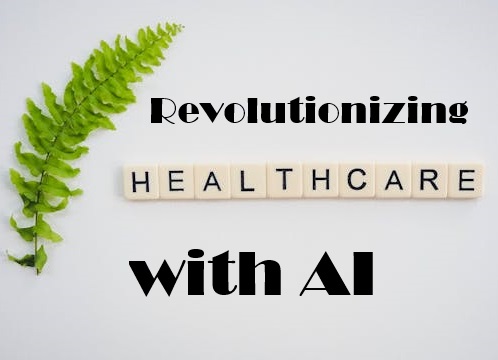How AI Is Revolutionizing Healthcare: From Diagnosis to Drug Discovery

Artificial Intelligence (AI) is transforming the healthcare industry, bringing unprecedented changes in how diseases are diagnosed, managed, and treated. From enhancing diagnostic accuracy to accelerating drug discovery, AI is paving the way for a new era in medicine.
Table of Contents
This article explores the profound impact of AI on healthcare, focusing on its applications in diagnostics, personalized medicine, drug development, and beyond. Whether you’re a healthcare professional, patient, or tech enthusiast, understanding these advancements will illuminate the revolutionary potential of AI in medicine.
The Role of AI in Diagnostics
1. AI-Powered Medical Imaging
Medical imaging is one of the earliest areas where AI demonstrated transformative potential. Algorithms trained on vast datasets can identify anomalies in X-rays, MRIs, and CT scans with remarkable accuracy.
Key Advancements
- Early Cancer Detection: AI tools like Google’s DeepMind have achieved radiology-level precision in identifying breast cancer.
- Cardiac Health Monitoring: AI can spot early signs of heart disease in imaging scans.
- Retinal Analysis: Detecting diabetic retinopathy through retinal scans.
Benefits
- Faster results.
- Reduced workload for radiologists.
- Improved diagnostic accuracy, leading to better patient outcomes.
2. AI for Pathology and Lab Tests
AI is revolutionizing pathology by analyzing tissue samples and blood tests at unprecedented speeds.
Applications
- Automating slide analysis for conditions like cancer or autoimmune diseases.
- Identifying biomarkers for specific diseases.
- Reducing human error in test result interpretation.
AI in Personalized Medicine
What Is Personalized Medicine?
Personalized medicine tailors treatments to individual patients based on their genetic profiles, lifestyle, and environmental factors. AI plays a pivotal role in making this approach viable.
AI Contributions
- Predictive Analytics: AI predicts disease susceptibility, enabling preventive care.
- Genomic Sequencing: AI accelerates the analysis of genetic data, identifying mutations linked to diseases.
- Customized Treatment Plans: AI recommends specific drug combinations or therapies based on patient profiles.
Real-World Example
IBM Watson Health has developed AI systems that analyze a patient’s medical history alongside research data to recommend personalized treatment options for cancer patients.
How AI Is Transforming Drug Discovery
Challenges in Traditional Drug Development
- Lengthy timelines (10-15 years).
- High costs (billions of dollars).
- Low success rates.
AI’s Impact on Drug Discovery
AI shortens drug development timelines and reduces costs by identifying potential drug candidates faster.
Key Applications
- Compound Screening: AI predicts how different molecules will interact with biological targets, narrowing down the best candidates.
- Drug Repurposing: AI identifies existing drugs that can be repurposed for new diseases.
- Clinical Trial Optimization: AI identifies suitable participants, predicts outcomes, and minimizes trial durations.
Notable Success Stories
- Insilico Medicine: Used AI to identify a drug candidate for fibrosis in just 46 days.
- DeepMind’s AlphaFold: Solved the protein-folding problem, revolutionizing drug discovery and biological research.
AI in Patient Care and Monitoring
AI-Driven Virtual Assistants
Virtual assistants like chatbots are enhancing patient care by providing 24/7 support.
Functions
- Scheduling appointments.
- Providing medication reminders.
- Answering patient queries.
Remote Patient Monitoring (RPM)
AI-powered RPM systems monitor patients with chronic illnesses in real-time, alerting healthcare providers to abnormalities.
Benefits
- Improved disease management.
- Reduced hospital readmissions.
- Enhanced patient satisfaction.
AI in Surgery
AI-assisted robotics are redefining surgical precision and efficiency.Applications
- Pre-Surgical Planning: AI analyzes patient data to recommend optimal surgical approaches.
- Robot-Assisted Surgeries: Systems like da Vinci Surgical System enable minimally invasive procedures.
- Post-Surgical Monitoring: AI tracks recovery progress and flags potential complications.
Ethical Considerations and Challenges
While AI offers immense potential, it also raises ethical concerns and challenges.
Key Issues
- Data Privacy: Ensuring sensitive patient data remains secure.
- Bias in AI Models: Preventing discriminatory outcomes due to biased training data.
- Accountability: Determining liability when AI systems make errors.
- Adoption Barriers: High costs and resistance from healthcare professionals.
AI’s Role in Global Health
AI is not limited to high-income countries. It’s making healthcare more accessible worldwide.
Examples
- Telemedicine: AI-powered platforms provide remote consultations in underserved areas.
- Disease Outbreak Prediction: AI identifies early signs of epidemics, helping governments respond effectively.
- Affordable Diagnostics: AI tools like smartphone-based imaging make diagnostics accessible to low-resource settings.
The Future of AI in Healthcare
The integration of AI into healthcare is still in its early stages, but the potential is boundless. Future advancements may include:
- Fully autonomous AI surgeries.
- AI-driven mental health solutions.
- Real-time genetic editing using AI-based CRISPR technologies.
AI is undeniably revolutionizing healthcare, offering breakthroughs in diagnosis, drug discovery, and personalized treatments. Its ability to enhance efficiency, reduce costs, and improve patient outcomes makes it a game-changer in medicine.
However, navigating the challenges of ethical concerns and adoption barriers is crucial for realizing AI’s full potential. As technology evolves, so too will its impact on healthcare, shaping a future where medical care is more precise, accessible, and effective.
